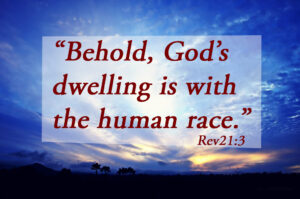G.K.Chesterton writes in Othodoxy, “We need so to view the world as to combine an idea of wonder and an idea of welcome.” He is saying that each of us needs to be “at home” in the place where we are and have a sense of “wonder” and comfort about it but at the same time, we need to “welcome” and invite the strangeness and newness of what we have thus far not experienced or become accustomed.
The “perfect” follower of Christ has learned to balance his/her seeking to maintain the comfort of home with bringing into it that which is good but, as yet, less familiar. In order to become more perfect, we who profess to be following Jesus need to provide ourselves opportunities to examine where we are mentally and spiritually, admit our inconsistencies and, with God’s help and our corrective measures, become more genuine images of Christ in today’s world. (We often take corrective action when we over-eat or under-exercise. Our spiritual health needs balance, too – perhaps, even more so!)
The questions below, provided by Mark Schmidt (www.thewitnessonline.org), are not an exhaustive list but may be a good start for balancing our senses of comfort and welcoming. Once brought to our attention we can acknowledge our excesses and deficiencies, ask for forgiveness and begin working to correct them so that our actions mirror our personal beliefs. Begin by finding a quiet place and slowly ponder the questions in this examination of conscience and see which, if any, apply to you. If something stirs within you, stop and let what wants to come to light surface. See where it takes you. Talk to God about this and ask God to help you acknowledge your weakness and need for healing. This will lead you to genuine conversion.
- Do I interact with people who are different from me outside of work or school?
- Do I read books or stories written by people of different ethnic or religious heritage than myself?
- Have I taken the time to listen to the voices of others who don’t look like me or have a different background and life experience than me?
- If in a supervisor role, have I included people of various cultural or ethnic backgrounds when developing professional guidelines and/or dress codes?
- Have I ever said the following phrases or something similar: “she’s pretty for a black girl,” “he’d be handsome if he wasn’t so dark,” “that little girl would be cute if her mom did her hair,” or made other judgments on beauty and acceptance.
- Have I ever asked someone about their heritage or ethnicity by asking “so, what are you?”
- Have I ever seen someone on the street and made a judgement based on how they dress, how their hair is styled, how they walk, how they speak?
- Have I ever participated in or laughed at jokes or comments that belittle or denigrate people who don’t look like me or practice a different faith than me?
- Do I blame the victims who suffer poverty and/or oppression for their plight?
- Do I try to come up with excuses for things I do or say that are perceived as racist or harmful by others?
- Do I dismiss the concerns or observations of others as simply being “overly sensitive” or being “PC”?
- Do I ask someone that I am an acquaintance with in social or professional settings to speak for their entire culture? Do I use a friend or family member who is of a different background than my own to “prove” that I have said or done nothing wrong?
- Have I ever said “I’m not racist, but…” Do I always speak to others from different backgrounds with respectful tone and language?
- Do I automatically associate negative attributes to an entire group of people?
- Do I use dehumanizing language about others, referring to them as “thugs, animals, illegals,” etc.
- Do I categorize other ethnicities into groups like “good” and “troublesome”?
- When trying to show a broad ethnic representation for my community or institution do I randomly place minorities in advertisements?
- Do I ask for input on how advertisements may be perceived outside of my own culture?
- Do I take the time to learn and listen to the stories of others’ lives in order to better understand them and the challenges they may face that I do not? Do I see Jesus Christ in each and every person I encounter every single time?
- Do I love each and every person regardless of their heritage, the choices they have made, their status in society or the perception I may have of them?
Mark Schmidt is the director of the Respect Life/Social Justice Office of the Archdiocese of Dubuque. This examination of conscience was published by The Witness Publishing Co. which is responsible for the production of the official Archdiocese of Dubuque publication. It features local news and national and international news from Catholic News Service in Washington, D.C.




